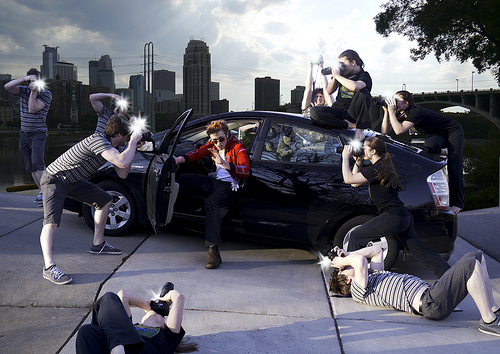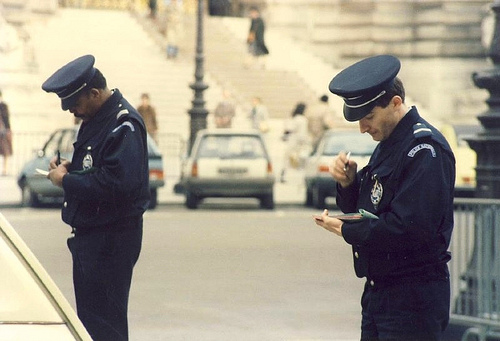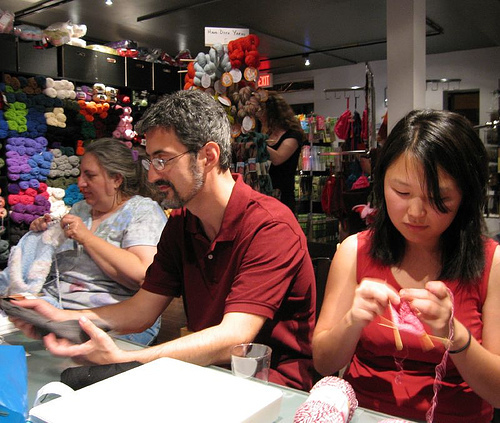Julie Duffy's Blog, page 171
March 18, 2014
[Reading Room] Hint Fiction
This week I bring you not a story but a collection of stories.
However, each story is only 25 words long.
In the introduction, editor Robert Swartwood says that short fiction,
“…should be complete by standing by itself as its own little world”
Here’s one of my favorite stories in the collection:
“Jermaine’s Postscript to His Seventh-Grade Poem Assignment,” by Christoffer Molnar.
“Ms. Tyler, the girl part was about Shantell. Please don’t tell anyone.”
Writing a 25 word story seems like it would be easy, but reading through the more-and-less successful stories in this collection three things stood out
A lot of thinking goes into a short story
Creating a compelling main character is essential if you’re not going for the quick, humorous, punch-line story.
Finding ways to do that in so few words is a fascinating challenge.
To distill the essence of a moment, a person, an interaction, down to 25 words takes a lot of effort and these writers have done an amazing job!
Kind of makes you want to try it, doesn’t it?




March 13, 2014
Where Do You Write?
Over at my personal blog today I wrote about my love for the coworking space I rent in my town. I jokingly call the old industrial building my ‘writer’s garret’ and my post was called “Everybody Needs A Garret”.
Which got me thinking. While it’s important to be able to write everywhere and any time and in long or short increments, it is incredibly powerful to have a space or a routine that helps you focus on your writing.
Where Do You Do Your Best Writing?
Some people, like me, have the luxury of time, a hip hometown and a little extra moolah, and can rent cheap, shared office space as a writing garrett.
Other people carve out space in a disused closet or the space under the stairs, jam headphones on their ears and pound away at the keys there.
Some people write in bed, on buses, in libraries and coffee shops.
Your Own Writing Space – Some Tips
If you want to try out having a writing space here are some tips:
Search your local area for a coworking space or a writers’ collective with desk space for rent. You might be surprised at how much flexibility you can find for relatively little cost (I worked it out. If I spend a morning working at a coffee shop I’ll buy a fancy coffee and probably a breakfast sandwich or something for lunch, to assuage my guilt at hogging one of their tables all morning. I might buy a bottle of water or a second coffee too. That’s probably $10-14 per trip. I only have to turn up at my coworking space 10 times a month to match that…and here I don’t have to ask a stranger to guard my gadgets while I run to the loo.)
 Carve out a space in your home. It can be as little as an under-used corner of the kitchen, under the stairs, below an awkwardly sloped ceiling, in the space between two doorways. Pick up a cheap desk or, if you want a standing desk, pop this lap desk on top of a sideboard/buffet and call it your ‘desk’. (This really cuts down on the amount of space you need, as there is no chair to worry about). Maybe order an lightweight room divider screen that you can set up around yourself while you work and fold up when you’re finished. Get a desk lamp to illuminate (and focus) your little corner. Let everyone know that, when you’re in your writing space, this is Writing Time and tell them how long they have to leave you alone before they are allowed to have their next emergency. 1
Carve out a space in your home. It can be as little as an under-used corner of the kitchen, under the stairs, below an awkwardly sloped ceiling, in the space between two doorways. Pick up a cheap desk or, if you want a standing desk, pop this lap desk on top of a sideboard/buffet and call it your ‘desk’. (This really cuts down on the amount of space you need, as there is no chair to worry about). Maybe order an lightweight room divider screen that you can set up around yourself while you work and fold up when you’re finished. Get a desk lamp to illuminate (and focus) your little corner. Let everyone know that, when you’re in your writing space, this is Writing Time and tell them how long they have to leave you alone before they are allowed to have their next emergency. 1Carve out an Aural Writing Room by picking up a decent pair of big, obvious over-the-ear headphones2 and a White Noise or ambient sounds generator (White Noise is ok, but I really like the Study app for iOS, which has soothing spa-like music and birdsong that is supposed to make you smarter).
 Remember, a Writing Garrett isn’t an office. You don’t have to have filing cabinets and lots of shelves 3. I keep my essential writing supplies for the major current projects together in a backpack. I grab that, and go – whether my writing space for the day is the Garrett or ‘back under the covers’.
Remember, a Writing Garrett isn’t an office. You don’t have to have filing cabinets and lots of shelves 3. I keep my essential writing supplies for the major current projects together in a backpack. I grab that, and go – whether my writing space for the day is the Garrett or ‘back under the covers’.Do you have a space where you write? Post a comment (or share a picture) below.
It will probably take a long time and some persistence before this lesson kicks in at all, even with other adults. ↩
Make them big and obvious to signal to the world that you are Not Available! ↩
You already have books all over your house, don’t you? ↩




March 11, 2014
[Write On Wednesday] The Glitterati
Does your everyday life seem pretty unglamorous? What about your town?
What if you walked down the street one morning and discovered that a whole bunch of glamorous, exciting people had come to town for a spell?
The Prompt
Write a story about a small town invaded by glamorous/exciting people
Tips
The exciting people could be movie or pop stars on a location shoot, or high-profile politicians in town for a rally, or scientists flocking to study an unnatural phenomenon (think: Flight Behavior by Barbara Kingsolver), just as long as it upsets the status quo.
Who are they? Why are they there? Who do they meet?
What do the local people think about all this?
What does your main character feel about them at the start of the story? At the end?
Who learns something from this visit? What?
Also, if you have only ever lived somewhere exciting, seeing celebrities at every coffee counter, write instead about someone really ordinary coming into a situation filled with glamour. Ask the same questions as above?
Go!




[Reading Room] Flax-Golden Tales by Erin Morgenstern
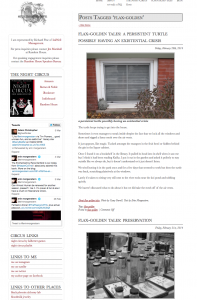
Every Friday Erin Morgenstern (author of The Night Circus) posts a Flax-Golden Tale: a ten-sentence story inspired by a photograph by Colin Farrell.
The stories themselves range from quirky to thought-provoking to funny and back again. Often the story gives a character to an inanimate object. The narrator’s voice is always strong. The writing is poetic, concise, efficient and a great model for how you might approach a short-short story, yourself.
Steal From Erin Morgenstern!
Not the words. (That would be plagiarism and that would be bad.) But we can learn from her practice.
She is doing it week after week after week, which is both challenging and freeing. Knowing she doesn’t have to get it right this week (because there is always next week) must be freeing, even as having a weekly deadline is challenging.
The ten-sentence format is wonderful. Knowing that she has to write ten sentences every time removes one of the many, many decisions a writer must face when sitting down to create something out of nothing (and decisions are often barriers to ‘getting stuff done’). Ten sentences is just enough space to tell a tale, but not so much that you get bogged down or lost. It is not intimidating. Setting small goals (except for during May, of course!) is a valid path towards success and fulfillment.
She is doing this for fun and for practice. She seems to have no desire to write these for publication, other than to post them, free, on her site (and I suspect that’s more about commitment and accountability than anything else). Writing for the love of it is something easily lost once you start practicing (and reading websites that urge to to publish, Publish, PUBLISH!)
This is a collaboration. Every week the photographer in the partnership has committed to providing a picture. Every week the writer writes a story. If one of them is having a bad week, their commitment to the other artist is a wonderful incentive to work, instead of waiting for inspiration (or putting off the act until ‘someday’).
What about you? Could you commit to a writing exercise like this? What would yours look like? Would you work with a collaborator? Leave a comment->




March 4, 2014
[Write On Wednesday] Misunderstood
Nobody loves the traffic warden. Or the referee. Or the person who tells you that yes, it’s going to be a root canal. But these people are, well, people, aren’t they?
The Prompt
Write an open letter to the world from an unloved character
Tips
You can use one of society’s whipping boys, such as the traffic warden, or you can use a fictional character (such as the witch from Hansel and Gretel — try to stick to characters that are in the public domain if you’re going to publish/post this anywhere)
The story can be a ‘day in the life’ story, where we *see* the character in a more sympathetic way, if you don’t fancy the idea of the open letter format.
The open letter could be in the form of a list of things we didn’t know about the maligned character or it could be an impassioned defense of their kind.
The character can be sad, angry, arrogant, pleading…whatever seems right.
Go!




February 26, 2014
Making Time To Write – Success Stories
I find it useful to read case studies from people who have actually WRITTEN books (and possibly had them published and worked on a sequel). Theory is all very well, but hearing from someone who has actually done it? Much more inspiring. They also tend to be more passionate, less forgiving and much, much more practical.
Here are a bunch of articles from working writers who answer the second-most-asked question they hear. [1. The first, of course, being "where do you get your ideas?"]
Jon Scalzi is a speculative fiction writer, Hugo award winner and creative consultant on the SyFy Network’s Stargate: Universe. He wrote an energetic answer to the time question which includes this choice paragraph,
There are lots of things I think I’d like to do, and yet if I don’t actually make the time and effort to do them, they don’t get done. This is why I don’t have an acting career, or am a musician — because as much as I’d like those, I somehow stubbornly don’t actually do the things I need to do in order to achieve them. So I guess in really fundamental way I don’t want them, otherwise I’d make the time. C’est la vie.
Jackie Kessler has written 12 novels (not all of them published, but hey, that’s a lot of writing time) and refuses to apologize for taking time to write.
Screenwriter John August shares his work-a-day experience of becoming a professional writer. It’s not sexy, but it worked.
Chip Scanlan talks about writing in small chunks, lowering your standards, rejecting the Soup Nazi.
And to finish things off for today:
Joanna Penn, The Creative Penn (@creativepenn on Twitter) shares this personal story, which debunks the ‘if I only had time’ myth a bit:
I once decided that I needed time to write my book. I had some money from the sale of my house, took 3 months off and tried to write every day. It didn’t work. I didn’t have anything to show for it, and went back to work disheartened at my inability to write. It was 4 years until I actually decided to try again.
Then I wrote “How to Enjoy Your Job” in 9 months of evenings, weekends and days off while working fulltime.”.
You can find the time – you just need to re-prioritise!




February 25, 2014
[Write On Wednesday] The Irritable Author
“Don’t you just wish…”
Have you ever said those words when something has really, REALLY irritated you?
Imagine what would happen if you followed through on all those little revenge-daydreams you have after someone scratches your car/talks incessantly on their phone in the library/dogears the corners of Volume 4 of your collectable edition of The Sandman 10 Volume Slipcase Set…
The Prompt
Write A Revenge-Fantasy Story
Pick something that really irritates you and write about a character who actually DOES the things you can only dream of doing (as a respectable member of a mostly-functional society).
Tips
Read the opening chapters of Rest You Merry by Charlotte McLeod. It starts when mild-mannered professor Peter Shandy finally snaps after being pressured to decorate his home for the annual college Christmas ‘Illuminations’. It’s deliciously hilarious.
Pick something that really gets under your own skin, the more mundane the better. (It will allow you to be more creative in your revenge!)
Show us the moment when your character snaps. Give us the physical and mental fugue-state breaking point. Remember not to tell us “he was so angry he couldn’t speak”, but to instead describe the pounding in his veins, the way his tongue cleaves to the roof of his mouth. Slow down time with the details, then let ’er rip!
Go!




February 18, 2014
[Write On Wednesday] Sidelong Glances
I once read an article that suggested it’s easier to talk to men/boys when you’re doing something else at the same time (some complex psychological study that showed men don’t like to talk directly to/about things but can have more meaningful conversations when engaged in an activity together).
I don’t know how accurate it is, but I do know it makes for an interesting writing prompt.
Write A Story Based Around A Hobby You Enjoy
Pick something you like to do, so you can include all kinds of realistic details (for example, I might pick knitting or gardening or singing in a choir because I could talk about the personalities and the clashes in a group that gets together around these hobbies. I could also talk about the moment of adrenaline that hits when you think you’ve dropped a stitch, or the sheer physical power it takes to belt out the chorus from “O Fortuna” along with all the bizarre warm-up tricks choral directors have subjected me to over the years, from ‘ma-me-me-mo-moo” to group shoulder massages!)
Tips
This is a great opportunity to work on character-building. Have your main character interact with all kinds of different characters in the group. See what shorthand you can use for each secondary character in the story, without descending into cliché.
Try including some tiny, here-and-now moments in the group that echo a larger issue for your main character. This strengthens the theme of the story. (e.g. if you discover that your main character’s issue is that she can’t seem to keep relationships together, allow one of the group’s participants to have issues with commitment to something in the hobby: one month he’s all about cacti, the next month he’s revamping his greenhouse to hold nothing but palms; maybe someone can’t ever seem to knit more than one sock in a pair before moving on to another project; perhaps the newbie on the sports team has been through 14 different sports before this one and can’t settle on one…). Mine other people’s reactions to this micro-problem to illuminate the answer to your main character’s macro-problem.
Linking your themes like this helps you transform a character sketch or vignette into an actual story that goes somewhere.
If you feel you’re missing the mark on this as you write your first draft, don’t worry. Make notes as you go to help you flag this stuff on a future rewrite. (e.g. [“link this to her issue with Dave?’].
The most important thing today, is to get a first draft finished. Get to the end of your main character’s story and set a date to come back and beef up all the theme/image/foreshadowing stuff later. (Pro tip: Put it on your calendar!)
Go!




February 13, 2014
Win A Trip To WANACon 2014
WANACon (run behind the minds behind the We Are Not Alone Tribe for writers) is coming!
The World Wide Writers Conference You Can Attend In Your PJs runs February 21-22, 2014 and it is going to be great.
I say this, in all modesty, as one of the speakers  I’ll be speaking with Gabriela Pereira of DIYMFA.com on “A Simple System To Rock Your Revisions” that works for novels AND short stories.
I’ll be speaking with Gabriela Pereira of DIYMFA.com on “A Simple System To Rock Your Revisions” that works for novels AND short stories.
You can WIN a FREE pass to the conference here:
a Rafflecopter giveaway




February 11, 2014
[Write On Wednesday] Things You Should Know About Me
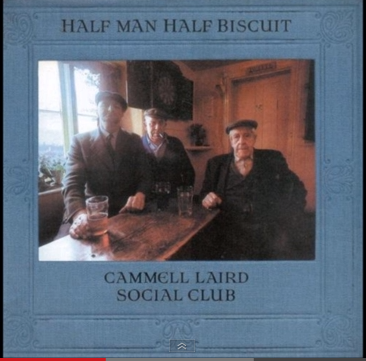
This idea for a story is ripped from the song “Them’s The Vagaries” by Half Man Half Biscuit (thanks, guys!). The narrator says, near the start of the song, “Now we’ve kissed I’ve prepared this list, I thought you ought to know…” and goes on to tell his new love about all his quirks starting with “I’ll not sit backwards on the train” and proceeding down to the most bizarre of pet peeves.
The Prompt
Write a story that begins “Now that we’ve kissed, here are some things you ought to know”
Tips
Write this as a monologue or a dialogue, whichever works for you. This has the potential to be funny or tragic. Feel free to write this as a list (like the McSweeney’s lists) or as a series of tweets, or as an oral history (which will make it more like a traditional short story in form). Even if you go with the non-traditional forms (lists etc) there is still a lot of scope for the beginning, middle, end structure. Only the journey you take your readers on will be emotional, rather than literal (from flippant to poignant; from innocent to creepy…). Think of the most colorful people you have ever met or the worst date you were ever on. Imagine one of those people writing this.







